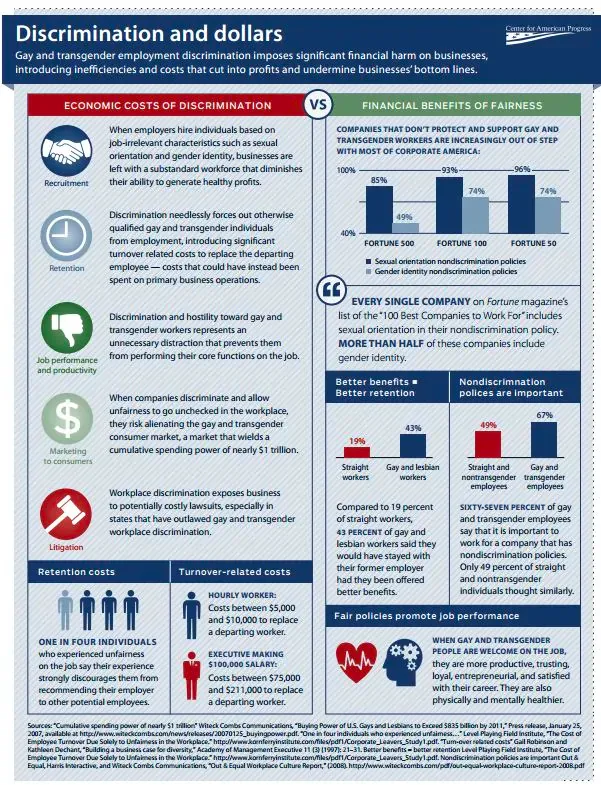As an employment lawyer in Nashville, Tennessee, I understand how important it is for businesses to comply with employment discrimination laws.
Not only is it the right thing to do, but it can also save businesses money in the long run.
In this blog post, I will discuss the cost of discrimination and the benefits of compliance and provide tips for businesses to promote inclusivity and compliance.
The Cost of Workplace Discrimination for Business Owners
Discrimination in the workplace can lead to legal penalties, including fines, damages, and legal fees. In FY 2022, the EEOC obtained more than $513 million in monetary benefits for victims of discrimination and resolved over 65,000 charges of discrimination.

Image Source: americanprogress.org
In addition to legal penalties, discrimination can also harm a business’s reputation, leading to lost customers and revenue.
Direct Costs of Discrimination
Discrimination can be costly for businesses in several ways. For example, in a 2019 survey by Glassdoor, 61% of employees reported that they would not apply to a company if it had a history of discrimination.
In addition, in a study by the National Institute of Health, discrimination was found to reduce the productivity of those who experience it, leading to a loss of work hours and productivity.
Indirect Costs of Discrimination
Discrimination can also lead to indirect costs for businesses.

In a study by the University of Massachusetts, businesses found guilty of discrimination experienced a 2.2% decrease in stock prices in the three days following the announcement of the verdict. This can result in a significant loss of value for shareholders and investors.
The Benefits of Compliance
Compliance with employment discrimination laws can benefit businesses in multiple ways:
1. Reduced Turnover
Discrimination can create a hostile work environment and lead to high turnover rates.
According to a survey by the Society for Human Resource Management (SHRM), 41% of employees who experienced discrimination left their jobs within two years.
In addition, in a study by the Center for American Progress, the cost of replacing an employee can range from 16% to 213% of their salary, depending on the level of the position.
By creating an inclusive workplace, businesses can retain employees, reducing turnover and saving money in the long run.
2. Improved Productivity
Fostering an inclusive workplace culture is critical to the success of both employees and the company as a whole.
According to research, businesses prioritizing inclusivity are twice as likely to meet or exceed financial goals, three times as likely to be high performing, six times more likely to be innovative and agile, and eight times more likely to achieve better business outcomes.
These statistics demonstrate the numerous benefits of building a culture that values diversity and promotes inclusivity.
By creating a welcoming environment for all employees, businesses can achieve positive growth and set themselves up for long-term success.
3. Enhanced Reputation
Discrimination can harm a business’s reputation, resulting in lost customers and revenue.

In 2018, a survey by Edelman found that 64% of consumers identify as belief-driven buyers, meaning they will buy from, boycott, or criticize companies based on their values.
In a study by Weber Shandwick, companies with a strong reputation for diversity and inclusion had a 28% higher likelihood of being recommended to others.
Businesses can enhance their reputation and attract more customers by promoting a culture of inclusivity and compliance with employment discrimination laws.
Tips for Promoting Inclusivity and Compliance
Here are some tips for businesses to promote inclusivity and compliance with employment discrimination laws:

1. Provide Diversity and Inclusion Training
One effective way to promote inclusivity and compliance is to provide employee diversity and inclusion training. This can help employees understand their rights and responsibilities under the law and promote a culture of respect and tolerance in the workplace.
In addition, by training managers and supervisors to recognize and address discrimination, businesses can reduce their legal risk and avoid costly penalties.

2. Establish Clear Policies and Procedures
Establishing clear policies and procedures can help businesses prevent discrimination and ensure compliance with employment discrimination laws.
This includes developing a formal policy against discrimination, outlining procedures for reporting and investigating complaints of discrimination, and providing clear guidance to employees on what behavior is acceptable and what is not.
By creating a culture of zero-tolerance for discrimination, businesses can reduce their legal risk and promote a positive workplace environment.

3. Conduct Regular Audits
Regular audits can help businesses identify potential risk areas and ensure compliance with employment discrimination laws.
This includes reviewing hiring practices, performance evaluations, and promotion criteria to ensure they are based on objective, job-related criteria rather than discriminatory ones.
In addition, by conducting regular audits, businesses can identify and address any issues before they escalate into legal problems.

4. Foster a Culture of Inclusivity
Fostering a culture of inclusivity is essential for promoting compliance and preventing discrimination. This includes creating an environment where all employees feel valued and respected, regardless of their background or characteristics.
By promoting diversity and inclusivity in hiring, promotions, and other business practices, businesses can attract and retain a diverse workforce and create a positive workplace culture.
5. Seek Legal Counsel
Finally, seeking legal counsel can help businesses navigate the complex laws and regulations related to employment discrimination.
An experienced employment lawyer can provide guidance on compliance, help businesses develop effective policies and procedures, and represent them in legal proceedings if necessary.
By working with a knowledgeable lawyer, businesses can ensure that they follow the law and protect their interests.
Conclusion
Discrimination can be costly for businesses in terms of legal penalties and damage to reputation. By following employment discrimination laws and promoting a culture of inclusivity, businesses can save money and set themselves up for long-term success.
Businesses can promote compliance and prevent discrimination by providing diversity and inclusion training, establishing clear policies and procedures, conducting regular audits, fostering a culture of inclusivity, and seeking legal counsel.

As an employment lawyer in Nashville, Tennessee, I encourage all businesses to take these steps to protect their employees and their bottom line.







